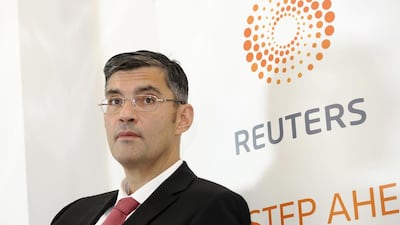The logistics company Agility may tap the debt market this year to help finance US$1 billion of projects and investments planned over the next four years.
One of the biggest companies listed in Kuwait, Agility had made commitments of about $1bn for projects, mainly in emerging markets, to improve profit growth, which has been flat because of weak global economic growth.
“We expect a third of those commitments to be funded by equity and the rest will be potentially debt,” said Tarek Sultan, Agility’s chief executive.
“There will be a potential issue this year.”
Last month, the IMF revised down its global economic growth forecast for this year to 3.3 per cent, from its 3.5 per cent estimate in April, because of weak first-quarter GDP growth in the United States.
“It is a challenging business environment, but we are confident because of our strategy to focus on emerging markets as well as on the infrastructure sectors,” said Mr Sultan.
“So we should experience fairly reasonable growth this year.” He declined to give a profit figure.
Agility’s net profit last year rose 10 per cent despite a 1 per cent fall in revenue. Its first-quarter net earnings this year rose 5 per cent as revenue increased 1 per cent.
The company is focusing on boosting productivity to boost revenue growth.
On Thursday, Agility reported a 5.5 per cent rise in second-quarter net profit to 13.5 million Kuwaiti dinars (Dh163.6m) from 12.8m dinars a year earlier, while revenue fell 3.9 per cent to 328.4m dinars.
Agility, one of the largest suppliers to the United States military in the Middle East, has changed tack since the start of a legal dispute with the US government in 2009, when US prosecutors filed a civil suit accusing the company of defrauding the government by allegedly overcharging it in a multibillion-dollar food contract. The indictment meant that it was stripped of its US contracts, which were a major source of revenue.
“It’s a legal case and is currently in the courts being adjudicated,” said Mr Sultan. “We will just have to wait and see what the court says.”
Presently, Agility’s logistics business in about 100 countries makes up 80 per cent of its earnings.
The remaining 20 per cent comprises of infrastructure and related businesses, including warehousing, distribution of fuel products, ground handling, and other services.
“The infrastructure business is intrinsically more profitable and this business is growing because of our footprint, and our footprint is emerging markets,” said Mr Sultan.
Pointing to what he said was the lack of infrastructure and a need for investments, he said Agility was “willing to make the investments that are needed in markets that traditionally have been thought of as being very risky, but to us they are our bread and butter”.
dalsaadi@thenational.ae
Follow The National's Business section on Twitter

